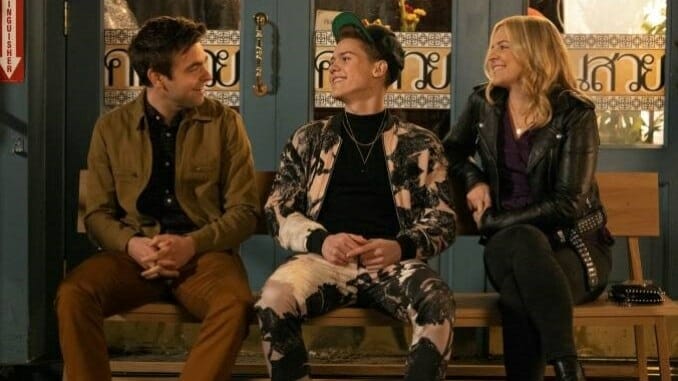The Other Two: TV’s Warmest Cringe Comedy
Photos by Greg Endries, courtesy of HBO Max Comedy Features the other two
The Other Two finally returns tomorrow, and if you start soon you still have time to crush through the entire first season before the new episodes hit HBO Max. The first season aired on Comedy Central in 2019, and quickly developed a cult following among critics and comedy fans with its surprisingly warm take on cringe comedy. Beyond its talented cast (which includes proven vets like Molly Shannon, Ken Marino, Wanda Sykes, and Richard Kind, alongside stars Heléne Yorke and Drew Tarver) and sharp writing, what sets The Other Two apart is its ability to deliver pointed satire in a way that remains grounded and human. A debate has raged online the last few weeks about whether Ted Lasso is too saccharine; The Other Two has an ideal mix of bitterness and… well, something that isn’t quite “sweetness” but still isn’t stressful or depressing. If you like your comedy to have an acidic bite to it, but struggle with the overwhelming negativity and discomfort of most cringe comedy, The Other Two might be what you’re looking for.
The key is that the relationships between the central family are rooted in something resembling reality. They can occasionally engage in ridiculous behavior, or brush up against absurd situations, but those almost always grow out of the show’s satire of the entertainment business. The Dubek clan interacts with each other in a recognizably human way. Despite his instant superstardom, 13-year-old Chase Dubek (a Bieber-ish viral pop star known as ChaseDreams) remains a good-natured kid with typical teenage interests who genuinely loves his mom and siblings. Molly Shannon finds the soul in what could’ve been a stereotype of a middle-aged suburban woman. And although Yorke and Tarver’s characters, who are drifting in both their lives and careers, can be selfish, petty and immature, they aren’t the utterly amoral cartoon characters you’ll often find in similar shows. Brooke and Cary Dubek aren’t David Brent from The Office or Dennis Reynolds from It’s Always Sunny; they’re believable adults who are just getting old enough to realize they’ll probably never achieve their dreams and ambitions, and although that can make them act in desperate, embarrassing, or even deplorable ways, it doesn’t make them bad people.
The Other Two nails the human side of its characters so well that when an often hinted at tragedy is finally revealed near the first season’s end it hits with the impact of any prestige drama. It helps you understand some of the Dubeks’ more extreme behavior, while also explaining why they remain so tight-knit and supportive of each other through it all. The Other Two doesn’t get “serious” too often, but when it does it has power, because you actually care for these characters as people and not just talented actors in a funny role.
Even the show’s pointed digs at the vapidity of modern culture don’t feel too exaggerated. Everything Sykes’ record label exec does to promote ChaseDreams is ridiculous, but it’s no more ridiculous than how the real pop music industry works. Ken Marino, who plays Chase’s manager Streeter Peters, is the closest the show gets to a cartoon character (and to a villain), but his actions still aren’t too far out of line with what you might expect from somebody like Scooter Braun, his obvious inspiration. (And as always, Marino brings a pleading, desperate urge to be liked and taken seriously that still shines through the almost bottomless well of Streeter’s insipidness and insincerity.) The fixation on youth, the way the business treats you as increasingly irrelevant the deeper you get into your 20s, and the awkwardness and superficiality of the whole damn industry might be easy targets, but The Other Two lands surgical strikes against it all without resorting to cliches or rehashed jokes.
That’s The Other Two’s greatest strength: it finds a perfect spot between discomfort and warmth. Unlike most network sitcoms, it’s not soullessly broad or treacly, but it also doesn’t have the unwavering cynicism of Veep or the cartoon sociopathy of It’s Always Sunny. You might cringe at Brooke or Cary’s latest attempt at fame, or how they tanked another promising relationship, but you don’t stop rooting for them. That might be hard to sustain for very long—let’s see how season two stacks up—but for at least one season that recipe made for something truly special.
Senior editor Garrett Martin writes about videogames, comedy, travel, theme parks, wrestling, and anything else that gets in his way. He’s also on Twitter @grmartin.